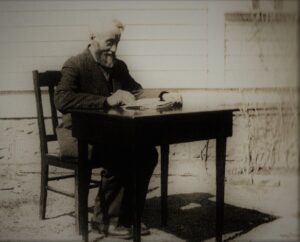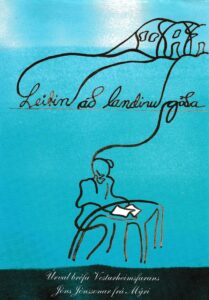
Sitting outside his home in Saskatchewan, Jón writing a letter. Photo “Leitin að landinu góða”
 Most emigrants from Iceland to America during the Emigration Period 1879-1914 made efforts to keep contact with relatives and friends in Iceland. Their only means were to write letters and, during the period in question, thousands were written and mailed home. Emigrants differed in their effort, some always found time to write, others were less industrious. Stephan G. Stephansson must have been one of the most productive but without any evidence one can name Jón Jónsson from Mýri in Bárðardalur as a close second. A wonderful book, Leitin að landinu góða, was published in Iceland in 2006, containing collection of letters Jón wrote in Canada and sent home. The editorial committee consisted of Heimir Pálsson, Jón Aðalsteinn Jónsson, and Jón Erlendsson. Most letters were written to Aðalbjörg, Jón´s daughter who remained at Mýri. The letters are most informative, quite obvious that Jón tried to describe daily life as well as those of Aðalbjörg’s siblings who emigrated with him and his grandchildren who were many. Also included in his letters was a thorough description of the territory he lived in, occupation of men and women, his children’s education as well as those of his grandchildren. The part of a letter printed below was probably one of the hardest to write as not only does he announce the death of Guðný, his daughter, but also the fate of her children as well as Indriði, her husband.
Most emigrants from Iceland to America during the Emigration Period 1879-1914 made efforts to keep contact with relatives and friends in Iceland. Their only means were to write letters and, during the period in question, thousands were written and mailed home. Emigrants differed in their effort, some always found time to write, others were less industrious. Stephan G. Stephansson must have been one of the most productive but without any evidence one can name Jón Jónsson from Mýri in Bárðardalur as a close second. A wonderful book, Leitin að landinu góða, was published in Iceland in 2006, containing collection of letters Jón wrote in Canada and sent home. The editorial committee consisted of Heimir Pálsson, Jón Aðalsteinn Jónsson, and Jón Erlendsson. Most letters were written to Aðalbjörg, Jón´s daughter who remained at Mýri. The letters are most informative, quite obvious that Jón tried to describe daily life as well as those of Aðalbjörg’s siblings who emigrated with him and his grandchildren who were many. Also included in his letters was a thorough description of the territory he lived in, occupation of men and women, his children’s education as well as those of his grandchildren. The part of a letter printed below was probably one of the hardest to write as not only does he announce the death of Guðný, his daughter, but also the fate of her children as well as Indriði, her husband.
Box 98, Wynyard, Saskatchewan, Canada
May 15- 22, 1924.
“Dear daughter.
Last letter sent April 22. I am not without hope that more of my letters to my children bring happy tidings one way or another. But and many are the others, which have brought sad news, even though I have attempted to look for the ray of sunshine in the darkest thunderstorm. And find them often more than expected. Because I have faced more adversity than most. And again, I have needed this. April 29, your sister Guðný was in labor. And at 10 am, midwife Solveig arrived and 10 1/2 am Dr. Jacobson. At close to 5 pm he assisted as the baby came feet first. A little later she (Guðný) suffered loss of blood, which gradually decreased. Her condition appeared to slowly improve. On the 3rd. Dr. Jacobson arrived, she was now losing blood again which increased in the late afternoon and early evening, so Dr. Jacobson was called again just after midnight. At that time, she had almost bled to death, which she did about 10 minutes later. The children were sound asleep upstairs except Hulda (Guðný’s daughter: Insert JTh). Just before Dr. Jacobson arrived, I went upstairs to check, nothing could be done for Guðný, I wanted to prevent her from the last sound she would hear was a baby crying. Norman (Guðný’s second youngest child) was awake then, lying quiet in his bed so I sat down on his bed. Up to that time she (Guðný) had kept her calm and spoke sensibly. Spoke a little what was ahead and what might happen. She said I was used to this so I would not lose my calm. And that nothing more could be done for her except be good to the children. After the doctor arrived he made several attempts, I thought I hear a cry of pain, but could be Hulda crying or something else, my ears are not as good as you know. Kristjana, your niece (Áslaug’s daughter In. JTh) arrived on the 30th and stayed until the 4th. Then Áslaug arrived and stayed until the 12th. The cousins (Jón probably refers to Kristjana and Guðný’s daughter In. JTh) worked well together, equally kind, considerate and calm. Kr. has inherited good qualities from both her grandmothers and more could be added. It goes without saying that the presence of a nurse through it all would have helped, but it still would have ended the same. She had suffered so much. And the thought that it would not end well was always there. She read the future better than anyone else I know. To see that she was pregnant was to me a very sad sight, as I always felt so good around her. On Sunday (the 4th) a few concerned friends showed up. And the boy was baptized on the 6th, given the name Baldur Guðni, Rev. H. Sigmar (ins. Rev. Haraldur Sigmar) delivered a funeral farewell. I stayed with the children (except Hulda who went to Kandahar) and a nurse from Wynyard, Miss Lory, who arrived just after Guðný’s passing, a good sending. An influential, sensitive and energetic person. In addition, Lóla (probably midwife Solveig) who I mentioned earlier. They left at 7.00pm and at 10.
A brief pause gives us a chance to say that newborn Baldur Guðni was the 11th child Guðný had with Indriði Skordal. She had Helga in Iceland in 1903 with Jón Þorvaldsson. The other children were 1. Hulda b. 1911 2. Björn Jón b. 1912 3. Haraldur Guðmundur b. 1914 4. Ásgeir Halldór b. 1916 5. Kjartan b. 1917 6. Baldur b. 1918 7. Kristjana Helga b. 1919 8. Hallgrímur Jóhann b. 1919, twin 9. Njáll b. 1920 10. Jón Norman b. 1922 11. Baldur Guðni b. 1924. What happened to the children? Jón explains below.
“It was decided to disperse the children. On the 10th, Haraldur and Kjartan left with Stgr. (ins. J.TH Steingrímur Jónsson) and his wife. Who your sister said surpassed all she had known in caring for children. And that is correct. Their daughters surpass all the girls in several ways, especially the younger one as Guðný and I agreed. Kristjana left with Hermann (ins. J.Th. Guðný’s brother) and his family. Indriði and I felt bad about adding to their burden. But Hermann insisted. And Stgr. agreed. Her name I believe had something to do with it. And that was the same in other instances, for example “auntie” (ins. JTh. Hallfríður Jónsdóttir, Jón’s sister-in-law) – Hulda and Hallgrímur left with Jón B. Jónsson (ins. JTh Jón Björnsson Jónsson pastor and President of the Icelandic Lutheran Church) and Fía, or Stefía, your aunt. It was important for Indriði they went there. He will be living there as well. He has been hired to look after the farm while Jón attends the Annual Church Convention in Manitoba this summer and will remain there longer, as Jón was closer to him than other men here, and the Jónassons (sons of Þorsteinn). On the 11th, Björn J. Hjálmarsson and Sigrún, daughter of Friðrik Friðriksson and Valgerður Björnsdóttir, left with Normann and myself to help him adjust to a new home. It is obvious to most that the boy is very attached to me. I doubt very much if my cheeks have before been as gently touched by a child, except Sigga in April and May of 1900 (ins. JTh. Sigríður, daughter of Jón, probably comforted her father when Kristjana, his wife passed away, April 12, 1900). Petrea Jónasson (ins. JTh. Þorlákur Jónasson’s daughter) arrived from Winnipeg to lend a hand. I think I mentioned that Fríða, her sister (ins. JTh. Hólmfríður) left for Winnipeg this winter but I must add that she was most helpful to Guðný and the children the past months before she left. She bought clothes this past winter for the children (on sale as is common here) which she intended to give them. She then learnt she would not be needed. So Petrea brought the clothes. They (Petrea and Fríða) wished to take care of Njall and Normann as Fríða knew they were close. Njáll had not been placed and looked forward to seeing Fríða. But they (ins. JTh. Björn Hjálmarsson and his wife) already had asked to take Normann which was accepted as I could be with him there to help him adjust, I could not afford the journey to Winnipeg. Petrea was keen on taking Kristjana as well, she and Njall had shared bed and were close. But that was not to be. And on the 12th Njall left with Petrea quite happy. He inherited some qualities from both parents, I hope his genes from Þingeyjarsýsla will come through. Áslaug traveled with them to Wynyard. Said he had gradually opened up, became talkative and happy.
Two requests came for the youngest one, but both met with some opposition. So the conclusion was that he would go with Áslaug and stay with her until a better place was found. He was thin and light, having digestive problems. He resembles his more handsome siblings. Eyes rather big which respond unusually quick to noise. Áslaug is used to children, all in her care have lived. Indriði carries a heavy load, no one dares to suggest he had chosen a home for him that was not suggested in the beginning or improper.”
